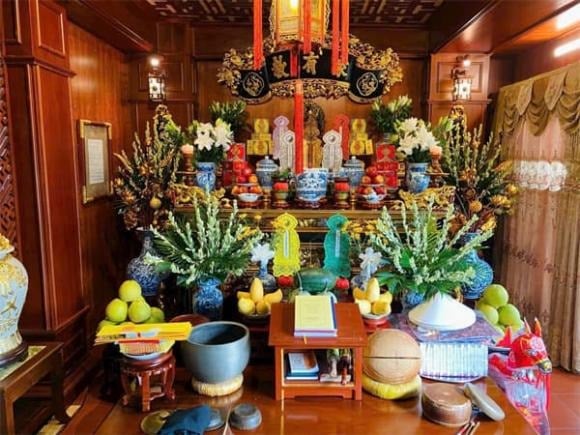A Word of Caution: “Two Taboos for Ancestral Altars That May Bring Chaos to the Family”
1. Ancestral Altar Facing Away From the House – Conflict Between Yin and Yang, Family Discontent
In feng shui, the direction of the house is determined by a straight line perpendicular to the center of the house, leading outwards through the main entrance. One of the most significant taboos is to position the ancestral altar facing away from this house direction. This is believed to create a conflict between yin and yang, leading to disharmony among family members, rebellious children, and a decline in fortune.
The only way to rectify this is to reposition the altar according to the directions that suit the homeowners’ lifepath. For those belonging to the East lifepath, the altar should face one of the favorable directions: Khảm, Tốn, Chấn, or Ly. For those of the West lifepath, the directions Càn, Đoài, Cấn, or Khôn are recommended. It is best to consult a feng shui expert to determine the most auspicious location.

2. Ancestral Altar Near the Kitchen or Toilet – Loss of Sanctity, Inviting Misfortune
The ancestral worship space demands tranquility, solemnity, and utmost cleanliness. Conversely, the kitchen emits strong fire energy and carries food odors and heat, while the toilet harbors foul air and moisture, potentially disrupting the energy field of the worship area.
Therefore, it is imperative not to place the ancestral altar adjacent to or directly opposite the kitchen or toilet. Doing so not only diminishes the sanctity of the worship space but may also lead to family instability and a decline in health and wealth.
Essential Considerations for Ancestral Altar Placement – A Must-Know for Homeowners
Ancestral Altar Location – A Sacred Space Demanding Serenity and Quietness
The ancestral altar, being a place of reverence for ancestors and deities, ought to be situated in a clean, serene, and elevated area. Ideally, this could be a dedicated altar room, the living room, or a less frequented area of the house.
Choosing an Altar Direction That Suits Your Lifepath – Inviting Wealth and Prosperity
The altar direction should align with the homeowner’s lifepath to boost positive energy. For homeowners of the East Lifepath (Khảm, Ly, Chấn, Tốn), the ideal directions are North, East, South, or Southeast. For those of the West Lifepath (Càn, Khôn, Cấn, Đoài), the directions West, Northwest, Southwest, or Northeast are recommended.
Maintaining a Tidy and Reverent Surroundings for the Ancestral Altar
The area surrounding the ancestral altar ought to be neat and orderly, devoid of clutter. Avoid placing the altar directly under a crossbeam or in the line of sight of the main entrance or room doors, as these spots are prone to negative energy that may affect the family’s fortune. Mirrors should also not be placed opposite the altar to prevent the dispersal of energy.

Height and Placement of the Ancestral Altar – Respecting Tradition
The ancestral altar should be positioned at a reasonable height, typically between 1.2 and 1.5 meters from the floor. This height strikes a balance between convenience for worship and maintaining solemnity. Avoid pushing the altar too close to the wall, leaving some space to prevent dampness and promote air circulation.
Arranging Items on the Ancestral Altar – Symmetry and Sincerity
The ancestral altar should include essential items such as the incense burner, flower vase, oil or electric lamp, candles, fruit tray, and ancestral photographs. These items should be symmetrically arranged, avoiding clutter. It is imperative to maintain the altar’s cleanliness, regularly changing the water, flowers, and incense as a sign of reverence.
3 Types of Plants to Bring Good Fortune and Peace to Your Home
“Elevate your surroundings and invite prosperity with these three exquisite ornamental plants, carefully selected for their beauty and positive feng shui energy. These plants are known to stabilize and enhance the energy flow in your home, attracting wealth, luck, and fortune for the entire family.”
Attract Wealth, Enhance Beauty, and Promote Family Health: The Magic of the Star Apple Tree
“The Carambola, or star fruit tree, is not just a pretty houseplant, it’s a symbol of prosperity and good fortune in Feng Shui. This unique tree with its vibrant, vibrant green foliage and distinctive fruit is an eye-catching addition to any home. Not only does it add a touch of natural beauty, but the Carambola is also packed with health benefits and is believed to hold secret powers for enhancing one’s beauty. Discover the many wonders of this amazing tree and unlock a world of wellness and good luck.”



































